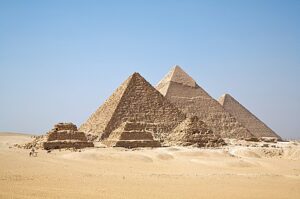Posts Tagged ‘complex’
Pyramids: The Perfect Gift for the Pharaoh Who Has Everything
We all know Pyramid schemes are bound to fail. Whether you’re undertaking a sketchy financial arrangement or undertaking a mummified pharaoh to his secret sepulchral chamber, pyramid schemes are an unworkable geometry. Why a nation-state should be in thrall of such a pseudo-religious structure is beyond me. However, I intend to reassess the bewitchery of these stony Jenga structures by examining the whys and wherefores of their construction set against the prevailing zeitgeist of 26th century BC Egypt. And, imitation being the highest form of flattery, I intend to construct my analysis precisely and deliberatively – piece by piece, stacking one belief atop the other until they form a really strong triangular argument with a point.
Ancient Egypt Wasn’t a Nanny State. It Was More of a Mummy State.
We can’t help but marvel at the majesty of the pyramids – their sacred vaults larded with gaudy treasures, their magically proportionate numerology hinting at supernatural intervention, and their cartoonishly detailed hieroglyphs heralding the advent of Pixar animation. These curious features all conspire to create a sense of breathless awe and baffling mystery. As Egyptology hobbyist Winston Churchill once said (and I’m paraphrasing here): “The pyramids are a mummy wrapped in a mystery inside of a really big shade structure.”
The greater mystery however, is in why a nation-state would allocate a whopping 99% of its GDP to build a really, really big headstone for a guy who would’ve been just as dead had a simple $50 grave marker been placed over his embalmed eminence. The resulting savings of $3 trillion (in 2500 BC adjusted dollars) could’ve been distributed a bit more beneficially to the citizens of ancient Egypt. At that time there were shortages of everything except sand. There were shortages of practical things like tourniquets, irrigation channels and roads. But the most critical shortage was one of common sense. Why else would Egyptians build these monuments to excess?
In the Egyptian scheme of spirituality, pyramids weren’t built so much to glorify a deceased pharaoh as they were to ensure his orderly transition of power from the earthly worlds to the nether worlds thereby avoiding the kind of afterlife chaos that could bleed into terrestrial realms. Happy King, happy subjects. In ancient Egypt this concept was known as appeasing Ma’at (Pronounced “Maw”, meaning divine order). Despite millennia of scholarly interpretation and rampant speculation, it turns out the mystery of pyramids was nothing more than a very big and very stupid insurance policy. And isn’t that essentially why many people practice religion today? Just in case there’s someone, somewhere with a ledger.
In a world where flooding, starvation and heat stroke were known as the prevailing conditions, the powers that be somehow thought it wise to divert 99% of their economic resources to stacking stones, on the pea-brain spiritual premise that by constructing such a geometric monstrosity, they’d be spared the wrath of their nature Gods. So they ponied-up literally a king’s ransom to appease these easily offended absentee Gods.
This is where the ancient Egyptians’ spiritual calculus breaks down. You see, if the flock was not paying proper respect to Ma’at and the pharaoh’s afterlife, they’d warrant a punishment for their misdeed. But in what manner would these absentee Gods punish their flock so they would feel the sting of their misbehavior? – by seeing to it that floods, starvation and heat stroke moved over the land? My point is, how would the peasants know the difference between experiencing the wrath of God’s retribution or just living under the prevailing conditions? Such irony when you can’t tell if you’re being punished or living the best life available. From this perspective, mollifying truant Gods by building resource-sapping pyramids presented an unmeasurable metric. You couldn’t tell if you were being punished or it was just Tuesday. Oh golly, such folly.



